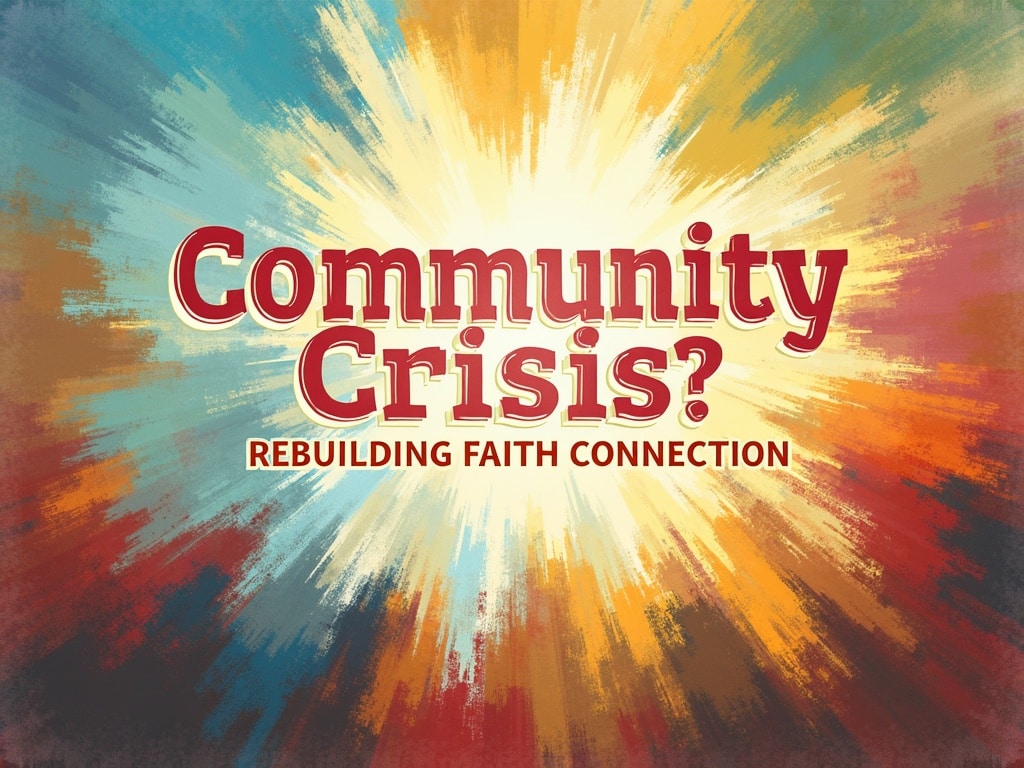Community Crisis? Rebuilding Faith Through Connection
Have you noticed a subtle shift? A quiet unraveling of the threads that once wove our communities together? Perhaps it's the increasingly isolating hum of digital life, the relentless pace of modern schedules, or a growing sense of division in our wider culture. Whatever the cause, many families are sensing a crisis of community, and it's impacting the very foundation of faith formation in our children. But the good news is that where there's a crisis, there's also an opportunity – a chance to intentionally rebuild faith through connection.
Recognizing the Signs: A Community in Crisis
What does a community crisis look like for families? It might manifest as:
- Decreased interaction with neighbors: Fewer conversations over the fence, less participation in local events.
- Increased isolation: Families retreating into their homes, relying more on digital connections than face-to-face interactions.
- Lack of support networks: Feeling alone in the challenges of parenting, without readily available help from friends or family nearby.
- Generational divides: Limited interaction between older and younger generations, leading to a loss of wisdom and mentorship.
- Civic disengagement: Reduced participation in local government, school boards, or community organizations.
These signs can have a ripple effect, impacting family well-being and, critically, a child's sense of belonging and faith development.
Why Community Involvement Matters for Christian Families
For Christian families, community involvement isn't just a nice-to-have; it's a vital expression of our faith. The Bible emphasizes the importance of fellowship, mutual support, and serving one another (Acts 2:42-47, Hebrews 10:24-25). Active participation in community life allows us to:
- Live out the Gospel: By demonstrating love, compassion, and service to those around us.
- Be a light in the world: By embodying Christian values in our interactions and actions.
- Support and encourage one another: By building relationships with other believers and sharing the burdens of life.
- Provide a positive influence: By modeling Christian citizenship and ethical behavior for our children.
The Impact of Isolation on a Child's Faith
A lack of community involvement can significantly hinder a child's faith development. When children are isolated, they may:
- Miss out on opportunities to witness faith in action: Seeing how other Christians live out their beliefs is a powerful learning experience.
- Struggle to develop a sense of belonging within the church: Without strong connections to other believers, children may feel like outsiders.
- Lack positive role models: Exposure to godly adults outside the immediate family can provide valuable guidance and support.
- Develop a narrow view of Christianity: Limited interaction with fellow believers can lead to a distorted understanding of the faith.
- Become more susceptible to negative influences: Strong community ties provide a buffer against harmful ideas and behaviors.
Practical Steps: Increasing Family Community Involvement
Rebuilding community starts with small, intentional steps. Here are some practical ways families can become more involved:
- Get to know your neighbors: Initiate conversations, offer assistance, and participate in neighborhood events.
- Attend local events: Support school functions, community festivals, and town meetings.
- Volunteer your time: Find a cause you're passionate about and dedicate a few hours each month to serving others.
- Join a small group at church: Connect with other families and build deeper relationships within the church community.
- Invite people into your home: Host a dinner, game night, or Bible study to foster fellowship and connection.
- Support local businesses: Choose to shop and dine at businesses that are invested in the community.
Churches as Community Catalysts
Churches play a vital role in fostering community connection among families. Churches can:
- Organize family-friendly events: Plan activities that appeal to all ages, such as picnics, movie nights, or service projects.
- Create intergenerational programs: Facilitate opportunities for older and younger generations to interact and learn from one another.
- Offer parenting classes and support groups: Provide resources and encouragement for parents facing the challenges of raising children.
- Partner with local organizations: Collaborate with schools, charities, and other community groups to address local needs.
- Promote community involvement from the pulpit: Encourage members to be active participants in their neighborhoods and towns.
The Power of Service: Rebuilding Faith Through Action
Service and volunteering are powerful tools for rebuilding community faith. When families engage in acts of service, they:

- Demonstrate the love of Christ in tangible ways: Showing compassion and meeting the needs of others is a powerful witness.
- Develop a greater sense of empathy and compassion: Serving those who are less fortunate helps families to appreciate their own blessings.
- Strengthen their own faith: Witnessing the impact of their service can deepen their understanding of God's love and purpose.
- Build stronger relationships with one another: Working together on a common goal can create lasting bonds within the family.
Finding (or Creating) a Supportive Faith Community
If you're feeling isolated, it's important to find a supportive faith-based community. If you're struggling to find one, consider these options:
- Explore different churches: Visit several churches in your area to find one that feels like a good fit for your family.
- Join a small group or Bible study: These smaller gatherings offer a more intimate setting for building relationships.
- Connect with other Christian families online: There are numerous online communities where you can share experiences and find support.
- Start your own group: If you can't find what you're looking for, consider starting a small group or Bible study in your home.
- Pray for guidance: Ask God to lead you to the community He has planned for you.
The Benefits of Intergenerational Connections
Intergenerational connections are a vital component of a healthy community. When older and younger generations interact, they can:
- Share wisdom and experience: Older adults can offer valuable insights and guidance to younger generations.
- Learn new perspectives: Younger generations can introduce older adults to new ideas and technologies.
- Combat loneliness and isolation: Connecting with people of different ages can provide a sense of belonging and purpose.
- Promote cultural understanding: Intergenerational interactions can help to bridge cultural gaps and foster empathy.
- Strengthen family relationships: Grandparents, parents, and children can build stronger bonds through shared experiences.
Technology: A Blessing and a Curse?
Technology can be a powerful tool for fostering community, but it also has its pitfalls. On the one hand, technology can:
- Connect people across geographical distances: Online communities can provide support and fellowship for those who are geographically isolated.
- Facilitate communication and collaboration: Social media and other online platforms can make it easier for people to connect and work together.
- Provide access to information and resources: The internet offers a wealth of information on a wide range of topics.
However, technology can also:
- Lead to social isolation: Spending too much time online can detract from face-to-face interactions.
- Promote negativity and division: Social media can be a breeding ground for conflict and negativity.
- Expose children to harmful content: Parents need to be vigilant about monitoring their children's online activity.
The key is to use technology intentionally and in moderation, prioritizing real-life relationships and interactions.
Inspiration in Action: Successful Community Initiatives
Looking for inspiration? Here are some examples of successful community-building initiatives by Christian families and churches:
- Community gardens: Creating a shared space for growing food and building relationships.
- Neighborhood Bible studies: Hosting a weekly Bible study in a neighbor's home.
- Mentoring programs: Connecting young people with positive adult role models.
- Community outreach events: Organizing events to serve and engage with the local community.
- Intergenerational worship services: Creating worship experiences that appeal to all ages.
These examples demonstrate the power of intentionality and creativity in rebuilding faith through connection.
Rebuilding Together
The crisis of community is real, but it's not insurmountable. By intentionally investing in relationships, serving others, and fostering intergenerational connections, we can rebuild faith through connection and create thriving communities where families can flourish. It takes time, effort, and commitment, but the rewards – stronger families, vibrant churches, and a more loving world – are well worth the investment. Let's start today, one connection at a time.

